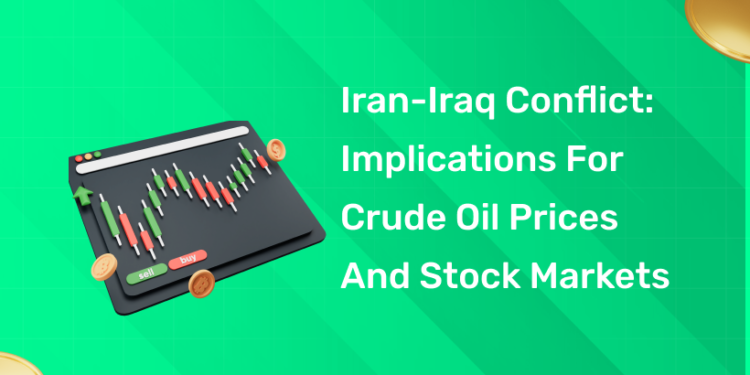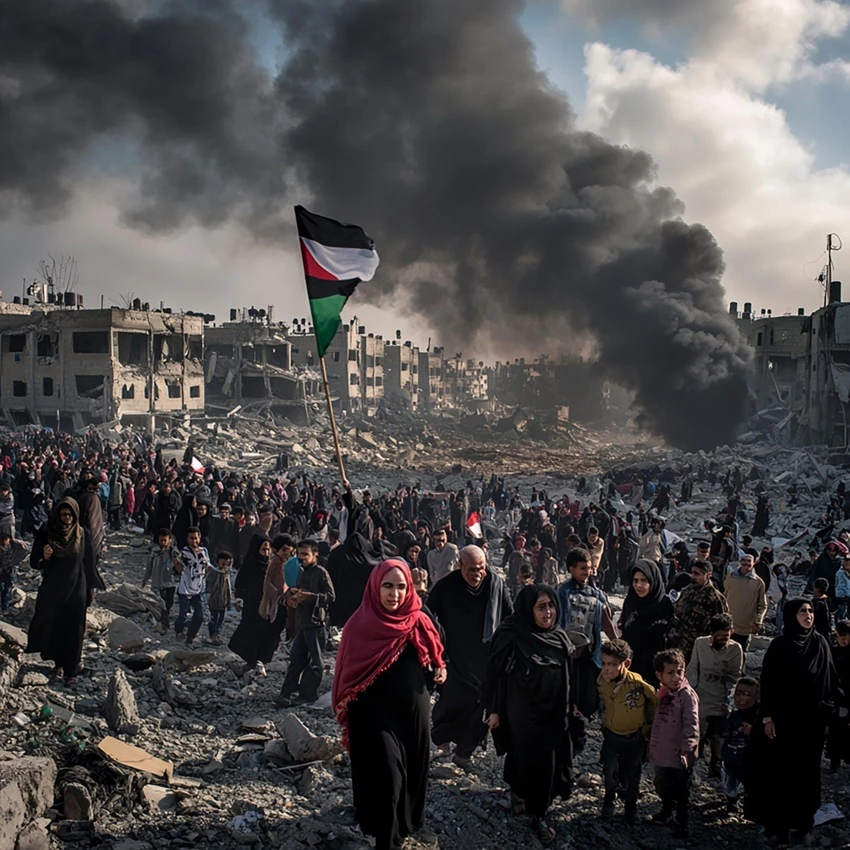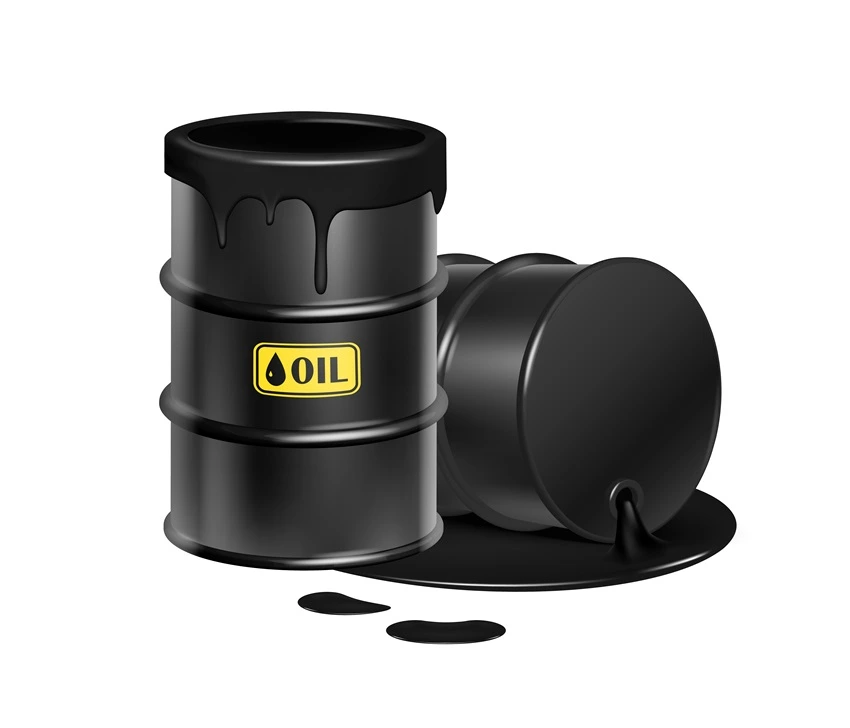Table of Contents
The Iran-Israel conflict that flared up in June 2025 has sent ripples through the global economy, shaking up crude oil prices, stock markets, and gold prices. Triggered by Israel’s airstrikes on Iran’s nuclear sites and Iran’s fierce retaliation, this conflict has put the Middle East, a powerhouse for the world’s Middle East oil supply, under a spotlight. For Indian investors watching their portfolios and grocery bills, the stakes are high. This post dives into how this conflict is impacting key markets and what it means for your investments in the global economy 2025.
Learn Stock Marketing with a Share Trading Expert! Explore Here!
What is Happening in the Iran-Israel Conflict
The Conflict
In early June 2025, Israel launched airstrikes on Iran’s nuclear facilities, missile production sites and top military leaders, escalating the long-standing tensions. Iran hit back hard, firing over 100 drones and missiles at Israel. Fears of a wider war grew. Iran has hinted at a possible ceasefire through talks with Qatar and Saudi Arabia but the situation remains tense with the Strait of Hormuz, a narrow channel that carries 20% of the world’s oil, in the crosshairs.
Why Markets Are Worried
The Middle East supplies a third of the world’s oil so any conflict here is bad news for markets. When oil flows are at risk crude oil prices rise, and everything from fuel to food gets more expensive. Stocks fall as investors worry about inflation and gold prices surge as people rush to safe havens. For India which depends heavily on Middle Eastern oil these shifts hit home hard, both in the wallet and investments.
How The Conflict Affects Crude Oil Prices
1: What is a stock?
The Price Rollercoaster
The Iran-Israel conflict has sent crude oil prices on a roller coaster ride. The Brent crude jumped almost 12% in a single day. The fear was that Iran might block the Strait of Hormuz and choke off 18-19 million barrels of oil daily. By June 16, prices dipped slightly to $73.23 (Brent) and $71.77 (WTI) as Iran signaled a possible ceasefire but the market remains jittery. If tensions escalate Brent could hit $100-$130 a barrel.
What It Means for India
India gets 45% of its oil from the Middle East, so higher prices mean costlier petrol and diesel. This squeezes households and businesses, from cab drivers to factories. Oil marketing companies like Indian Oil face tough choices, absorb the costs or pass them on, which could spark inflation. With elections looming, the government might cap fuel prices, putting more pressure on these companies.
What You Can Do
- Keep an Eye on News: Follow updates on the Strait of Hormuz, as any blockade would send prices soaring.
- Look at Energy Stocks: Consider investing in companies outside the Middle East, like U.S. oil producers, which supply 13% of global crude.
- Brace for Higher Costs: Budget for rising fuel and goods prices if oil stays above $75 per barrel.
How the Conflict Affects Stock Markets
Markets in a Tizzy
The stock market impact has been huge. On June 13, 2025, global stocks tanked,all major markets crashed almost 2 percent including the Dow Jones the Nasdaq. In India, the BSE Sensex, faced selling pressure as investors worried about inflation from higher oil prices. Airline stocks, like IndiGo, took a hit due to fuel cost fears, while defense stocks, like Hindustan Aeronautics, gained nearly 3%.
India’s Problems
Textiles and IT companies in India are feeling the heat from higher shipping costs and supply chain disruptions. Oil dependent sectors like aviation and logistics are reeling but pharma and utilities are relatively safe. Inflation may delay rate cuts by RBI making growth stocks less appealing.
What You Can Do
-
Go Defensive: Shift toward stable stocks like Sun Pharma or NTPC to weather the storm.
-
Protect Your Portfolio: Set stop-loss orders to limit losses if markets drop suddenly.
-
Stay Patient: If the conflict cools, growth stocks could rebound, offering buying opportunities.
Learn Stock Marketing with Share Trading Expert! Explore Here!
Why Gold Prices Are Rising
Gold’s Safe-Haven Appeal
The gold price surge shows investors seeking safety. On June 13, 2025, gold hit $3,423.30 per ounce globally, up 1.2%, and reached Rs 1,00,403 per 10 grams in India, close to all-time highs. With stocks wobbling and inflation looming, gold is a go-to hedge against uncertainty. Its 21% rise in 2024 proves its strength during crises.
What It Means for India
India loves gold and conflicts like this will increase demand, especially with the festival season approaching. Higher prices hurt jewellers but benefit those holding gold. For families saving for weddings or investments, gold is a lifeline when stocks and rupees fall.
What You Can Do
- Buy Gold Smartly: Look into gold ETFs or sovereign gold bonds for easy investing.
- Diversify Your Assets: Keep 5-10% of your portfolio in gold to balance risk.
- Watch Local Prices: Festival demand in India may push gold even higher so time your purchases wisely.
What’s Next for Markets
The Iran-Israel conflict has the global economy 2025 on tenterhooks. If Iran and Israel reach a ceasefire, crude oil prices may settle below $80 per barrel and ease pressure on stocks. But a blockade of the Strait of Hormuz would be a game-changer and could push oil to $130 and trigger a global recession. OPEC+ has 5 million barrels per day of spare capacity which can offset Iranian losses. Gold will stay high, prices 80% above pre-COVID levels through 2026.
For Indian investors the conflict is a reminder to stay agile. Defensive stocks and gold will protect you, energy stocks outside Middle East will benefit. A prolonged conflict will worsen inflation but a quick resolution will spark a market rally especially in oversold sectors like IT.
Stock Market Training Reviewed & Monitored by SEBI Registered RA
Trusted, concepts to help you grow with confidence. Enroll now and learn to start investing the right way.
Know moreStay Prepared for Volatility
The Iran-Israel conflict is a wake up call for investors. Keep your portfolio balanced with gold and stable stocks, stay updated on Middle East oil supply risks and be ready for sudden price movements. By being smart you can navigate the global economy 2025 and come out stronger.
Stock Market Training Reviewed & Monitored by SEBI Registered RA
Trusted, concepts to help you grow with confidence. Enroll now and learn to start investing the right way.
Know moreFrequently Asked Questions
What caused the Iran-Israel conflict in 2025?
Israel’s airstrikes on Iran’s nuclear and military sites in June 2025 triggered the conflict, with Iran retaliating using drones and missiles. Israel’s airspace closure and regional tensions raised fears of a broader war affecting the Middle East oil supply.
How is the Iran-Israel conflict affecting crude oil prices?
Crude oil prices surged 12% to $74.23 per barrel (Brent) in June 2025 due to fears of Strait of Hormuz disruptions. Prices later eased to $73.23 as Iran signaled a ceasefire, but volatility remains in the global economy 2025.
Why are stock markets reacting to the Iran-Israel conflict?
Rising crude oil prices fuel inflation fears, causing global stock indices like the Dow and BSE Sensex to drop. Investors are shifting to safe-haven assets, amplifying the stock market impact.
How does the conflict impact India’s stock market?
India’s BSE Sensex faces pressure from higher oil costs, hurting sectors like aviation and logistics. Defensive stocks like pharmaceuticals offer stability amid the stock market impact.
Could the Strait of Hormuz blockade happen due to the conflict?
A blockade is unlikely but possible if the Iran-Israel conflict escalates, disrupting 20% of global oil flows. Such an event could push crude oil prices to $100-$130 per barrel.
Which stocks are safe to invest in during this conflict?
Defensive stocks like Indian pharmaceuticals and utilities are safer bets during the stock market impact. Avoid oil-dependent sectors like aviation until crude oil prices stabilize.
Is gold a good investment during the Iran-Israel conflict?
Gold is a strong hedge against inflation and uncertainty, with the gold price surge making it appealing. Indian investors can consider gold ETFs or sovereign bonds for stability.
Will the Iran-Israel conflict lead to a global recession?
A prolonged conflict with oil disruptions could raise recession risks by driving inflation and slowing growth. A ceasefire, however, could stabilize markets in the global economy 2025.














